Shocking Advertisements from the Past
The world isn’t entirely free from ads that shock us for all the wrong reasons. It wasn’t so long ago that German car manufacturer Audi compared finding a used vehicle to finding a wife (in an ad that aired in China), or that Co-op supermarket caused outrage by suggesting parents “treat” their daughters for doing the washing up (in a UK print ad campaign).
So we haven’t completely left the misogynistic “Mad Men” days behind us, but the occasional sexist faux-pas is nothing compared to what used to be churned out by ad companies. It’s hard to believe people who were presumably deemed to be intelligent enough to make advertising decisions on behalf of the world’s biggest companies actually put this stuff out there. But they did, and it serves as a reminder to us that however bad things seem, they’re a lot better than they used to be. And we’re not just talking about misogyny. There’s also racism, doctors promoting cigarettes and grossly inappropriate parenting decisions.
‘You mean a woman can open it?’
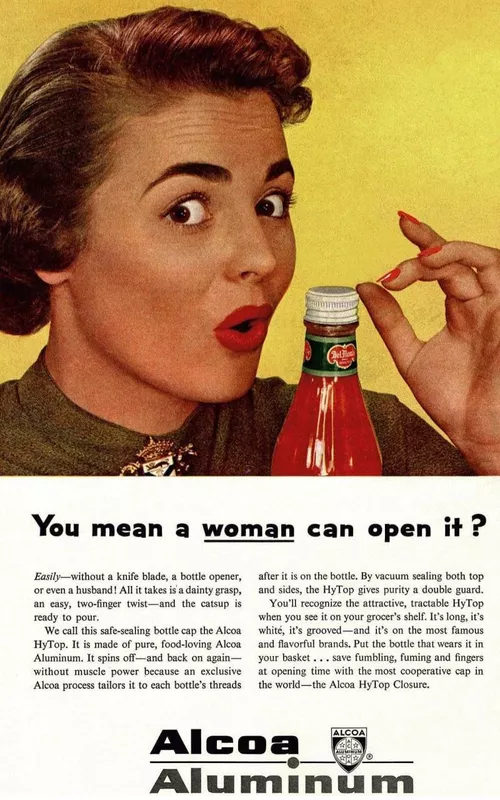
Alcoa Aluminum
Sexism was rife in the 1950s, and this advert produced by Alcoa Aluminum in 1953 pretty much sums up the attitude of the time. It features a picture of a woman holding a bottle of Del Monte ketchup with the tagline, “You mean a woman can open it?” With the word woman underlined, no less, in case anyone misses the point that women are simply too weak to open ketchup bottles. Thanks heavens for HyTop twist-off bottle caps, or men would have had to put ketchup on their own hot dogs.
‘This is no shape for a girl’
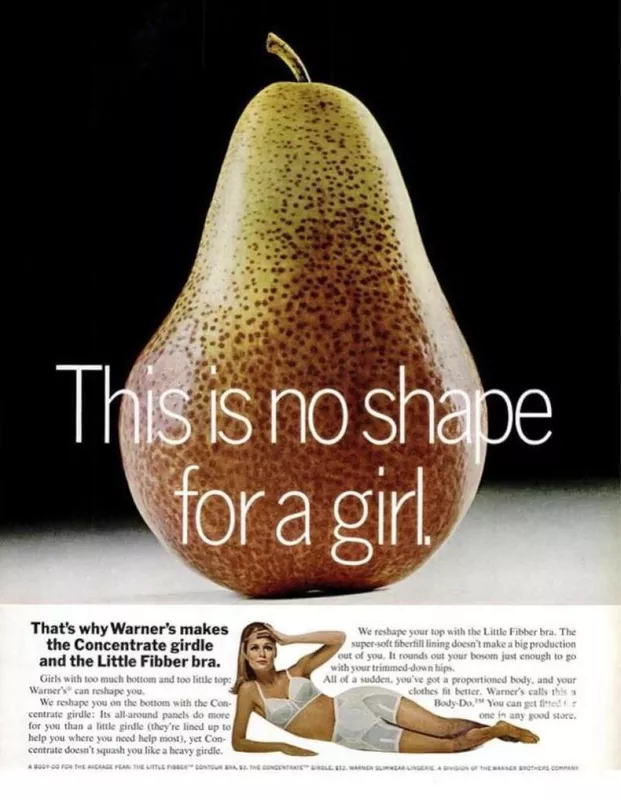
Warner’s
Body-shaming was around long before people posted selfies on the internet and other people destroyed them with their comments. In the 1970s, it was a vital tool in the ad machine’s arsenal. Make women hate their bodies, and they’ll spend money trying to “fix” them. Like this Warner’s ad for its “Concentrate” girdle and “Little Fibber” bra, which promised to deliver social acceptance to “girls with too much bottom and too little top.”
‘Begin Early. Shave Yourself.’
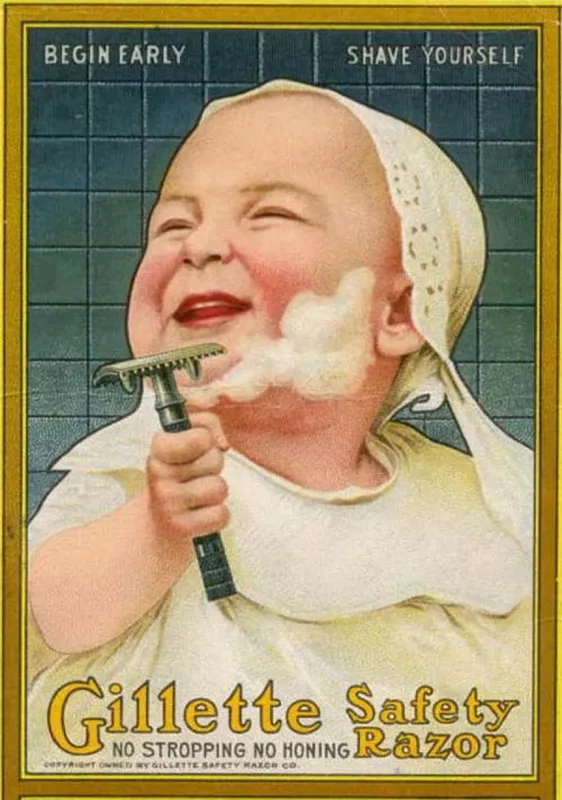
Gillette
In the midst of all this raging sexism, some might think there’s no reason to complain about a cute baby with its face all lathered up, pretending to shave. But this Gillette advert from the early 20th century, created to promote its safety razor, is super-creepy. For starters, there’s nothing that looks “safe” about that razor. And it looks like the tot is about to eat it, not “shave” with it. What’s even more worrying is that people still want to buy this and put it on their walls — or their kid’s nursery?
‘Cocaine Toothache Drops’
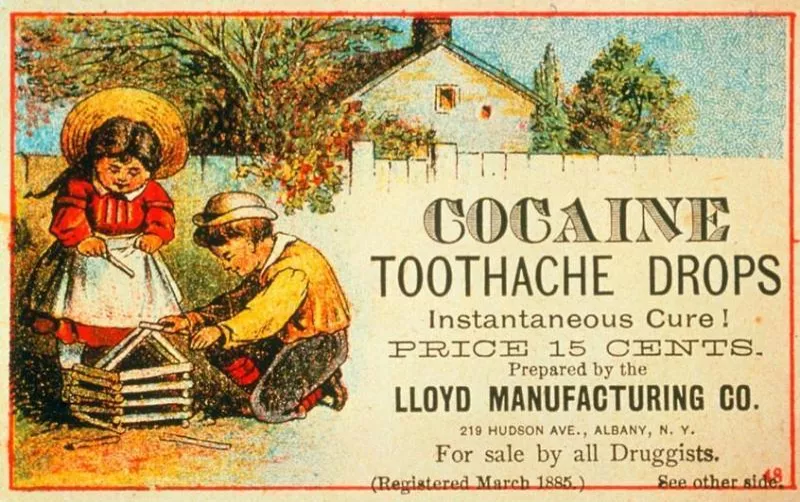
Lloyd Manufacturing
Vintage ads provide a fascinating insight into the weird, wonderful and downright dangerous ways people cared for their kids. In days gone by, so-called “miracle cures” for everyday ailments like coughs and serious illnesses like cancer and liver disease typically included substances like cocaine, morphine and alcohol. Cocaine toothache drops, available for 15 cents from druggists, were hailed as an “instantaneous cure” in 1885. The mind boggles.
‘More Doctors Smoke Camels’
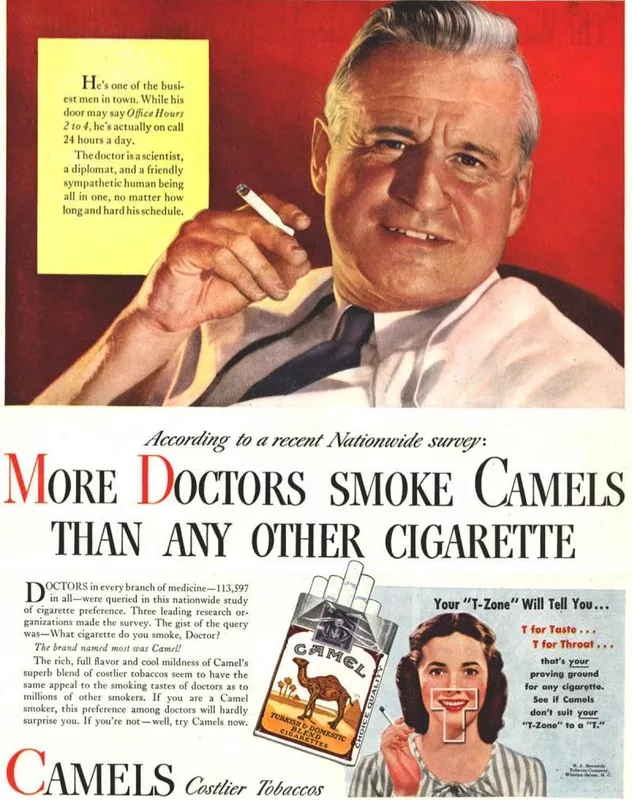
Camel
There are still people who believe everything their doctor tells them, but in 2019 that doesn’t tend to include recommendations for a particular brand of cigarettes. In 1946 (only 73 years ago), the friendly doc’s brand of choice was Camel, or so this R.J. Reynolds ad would have us believe, it we still believed such ridiculous, dangerous things.
‘Blow in her face’
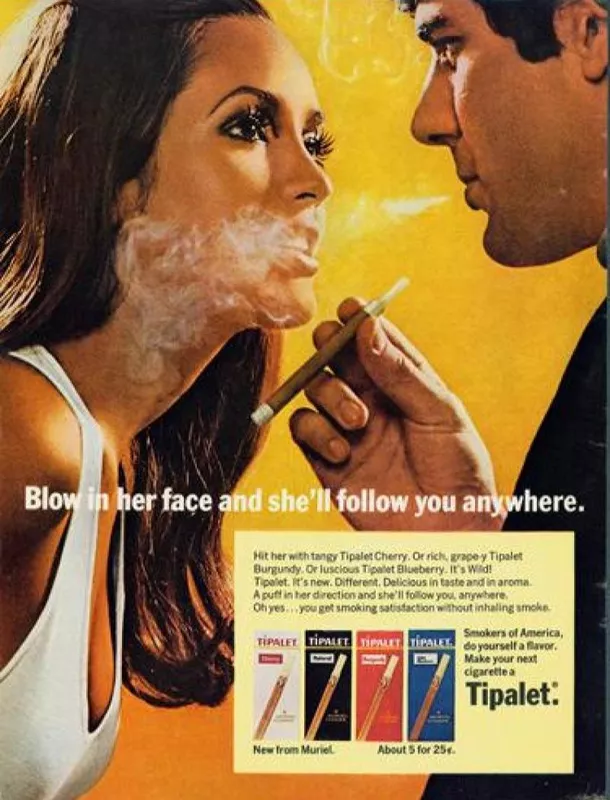
Tipalet
Twenty years later, millions of people still didn’t believe that smoking caused cancer, and cigarette companies were still pulling out all the stops to get people hooked. Perhaps aimed at the man who didn’t care what his doctor smoked, this Tipalet ad was a not-too-subtle suggestion (complete with a sexual undertone) that cigarettes made you more attractive to women. Did men in 1969 go around blowing smoke in women’s faces? It’s not completely out of the question.
Smoking Santa

Marlboro
When a doctor’s seal of approval isn’t enough, there’s always Father Christmas. If he smokes, then it has to be a good thing… right? Playing on the fact that everyone loves Santa, Santa can do no wrong, etc., pretty much all of the big cigarette manufacturers used the big guy in the red suit for an ad campaign. Did you know that another way to say “Merry Christmas” is “Pleasant Smoking?”
‘Does your husband yawn at the table?’
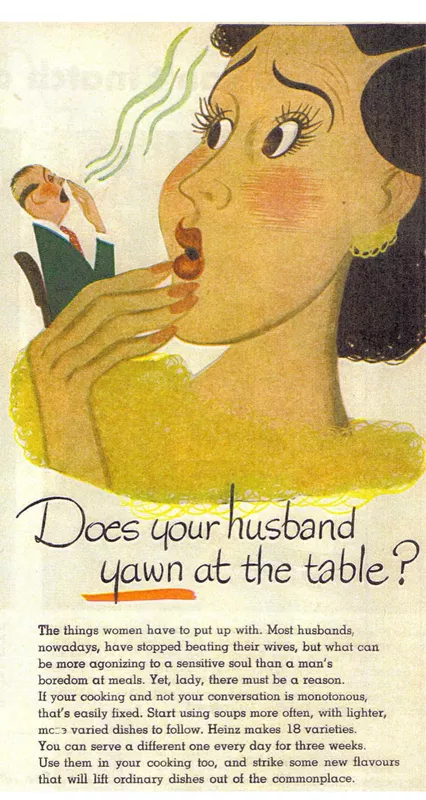
Heinz
In 1950, most husbands had stopped beating their wives, according to this ad for Heinz Condensed Soups, but a pressing issue was whether the man of the house was insufficiently entertained at the dinner table. Heinz didn’t offer a solution for “monotonous” conversation, but suggested that its “18 varieties” were just the thing to add excitement to mealtimes. Let’s hope that was the case and all those poor apathetic husbands didn’t fall asleep in their tomato soup.
‘If your husband ever finds out…’
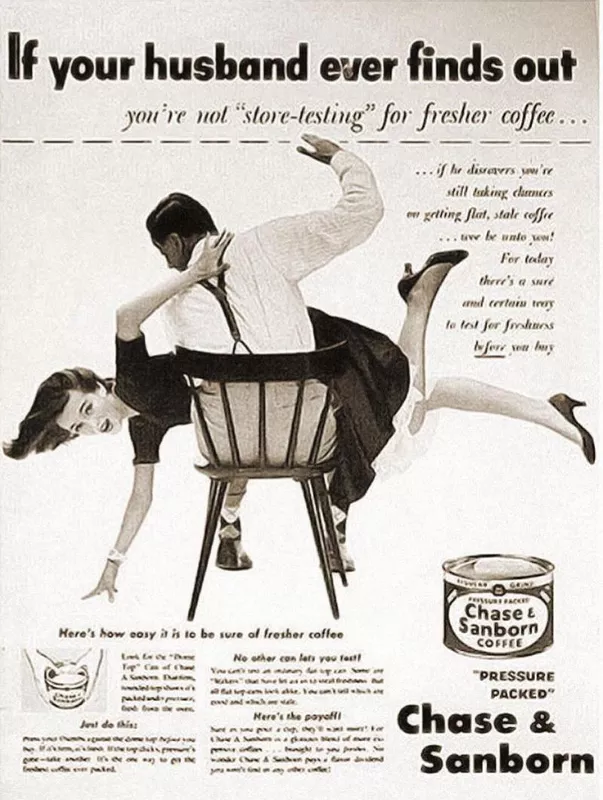
Nothing was off-limits to 1950s ad men, it seems — including domestic violence. This 1952 ad for Chase & Sanborn coffee shows exactly what wives who don’t serve their husbands fresh coffee could expect, making light of the abuse suffered by millions. (Because despite what Heinz claims, domestic violence was rife in 1950s America; shockingly, some doctors saw it as a positive thing in some cases, describing it as “violent, temporary therapy.”)
‘Keep her where she belongs’
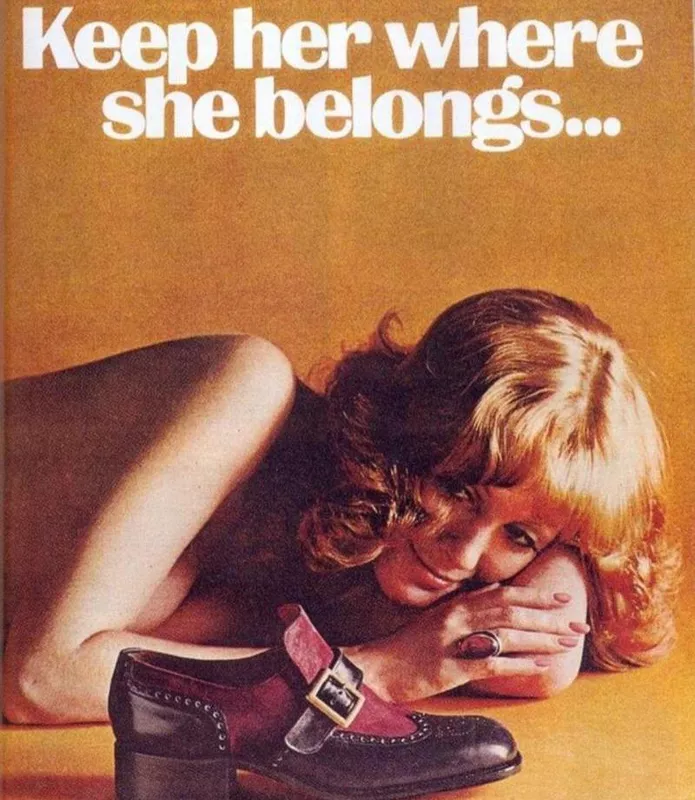
Weyenberg Shoes
In the 1970s, women still belonged in the kitchen — but some ads unleashed them from the stove, like this 1974 ad for Weyenberg Shoes. Presumably this woman was too busy swooning over her man and his choice of footwear to get on with her chores. In case the caption didn’t push the point home hard enough, the image says it all, and the fact that the model appears to be naked makes this all the more offensive.
‘Why we have the youngest customers in the business’
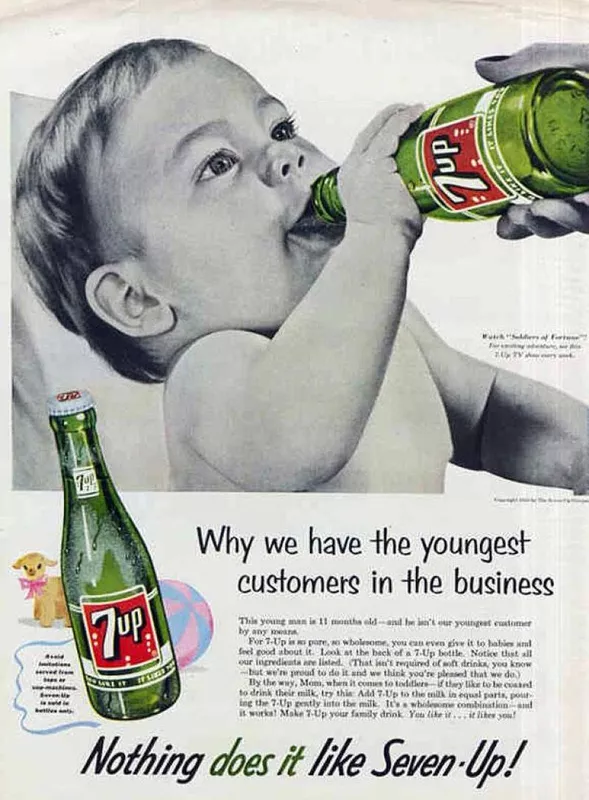
7Up
What, you’ve never given your baby soda? Not even as a treat? How about to make them feel better? Back in the 1950s, soda was believed to have medicinal purposes, so parents actually thought knocking back bottles of 7Up was doing their babies the world of good. The company even suggested a “wholesome combination” — adding soda to “coax” toddlers to drink their milk. Ugh.
‘Is it always illegal to kill a woman?’
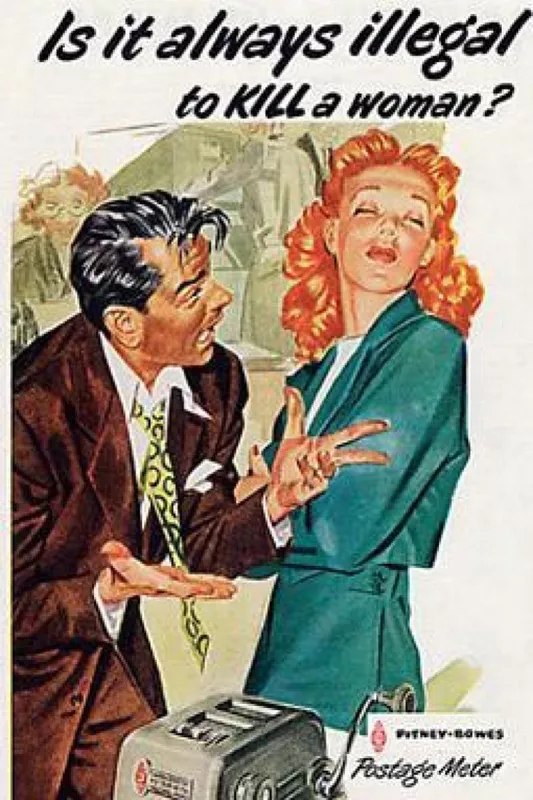
Pitney-Bowes
Running with the common theme of violence against women, this 1947 Pitney-Bowes postage meter ad takes it even further and poses the question, “Is it always illegal to kill a woman?” There’s a lengthy story to this one (did people back then really read all the small print?) but basically it involved a typist getting frustrated with machines, then loving machines thanks to her new postage meter. She loves it so much that she has lots of spare time to gossip with her co-workers, at which point her boss begins having murderous thoughts.
‘Why doesn’t your mama wash you with Fairy Soap?’
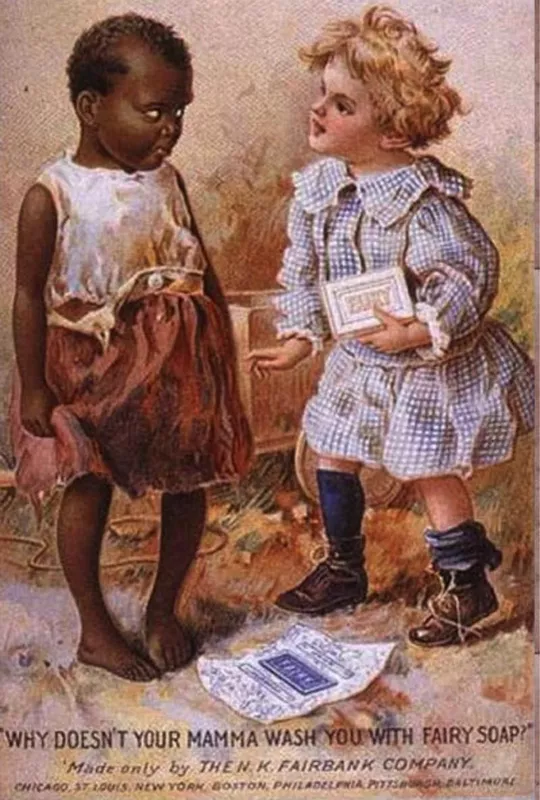
This Fairy Soap ad from 1897 shows a young, clean, white child standing beside a young black child, wearing dirty clothes, no shoes and an almost menacing expression. It’s propaganda for white supremacy, disguised as a child’s innocent question: “Why doesn’t your mama wash you with Fairy Soap?”
‘Get out of the kitchen sooner!’
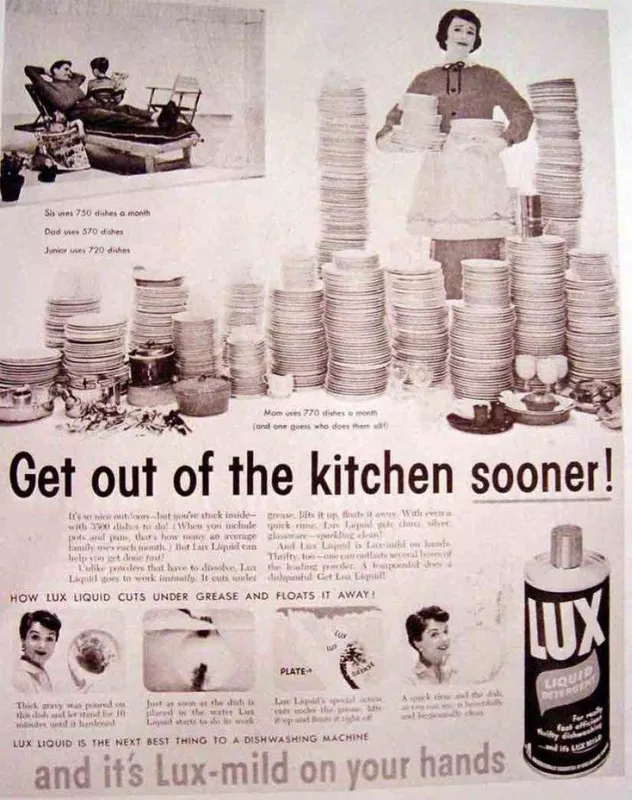
Lux
Ladies, why waste your time banging on about equality when you can solve all your problems with a liquid detergent? This Lux ad from 1955 told women three things: their place is in the kitchen; it’s their own fault if they haven’t finished the dishes (because they’ve been using an inferior cleaning product); and while they’re putting some elbow grease into it their husbands are sitting in another room with their feet up, having a nice chat with the kids.
‘Pull the Cords’
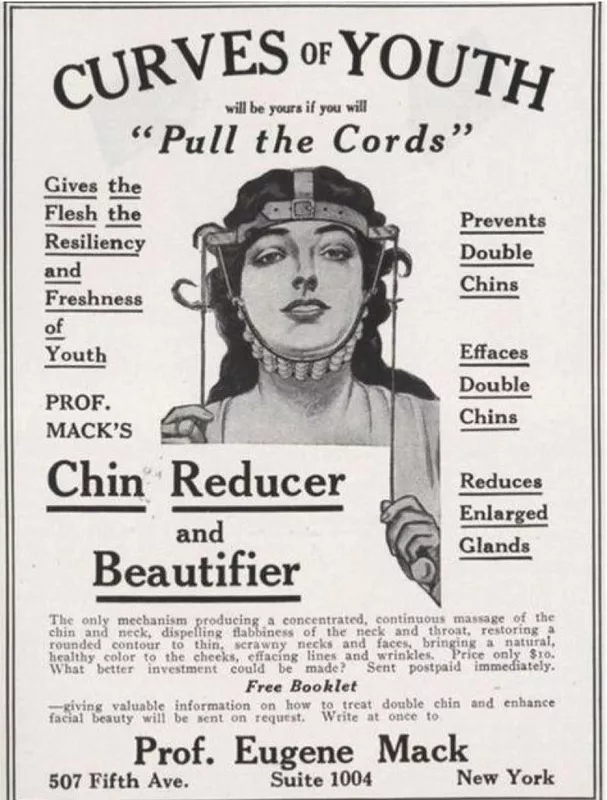
Prof. Mack’s Chin Reducer and Beautifier
If you think ads promoting anti-wrinkle cream breed insecurity, that’s nothing compared to what popped up on the pages of 19th-century magazines: scary contraptions designed to reshape your entire face. One such miracle-worker was “Prof. Mack’s Chin Reducer and Beautifier,” which promised to prevent double chins and reduce “enlarged glands.” Clearly, neurotic beauty fixations were the rage long before the days of reality television.
‘It’s nice to have a girl around the house’
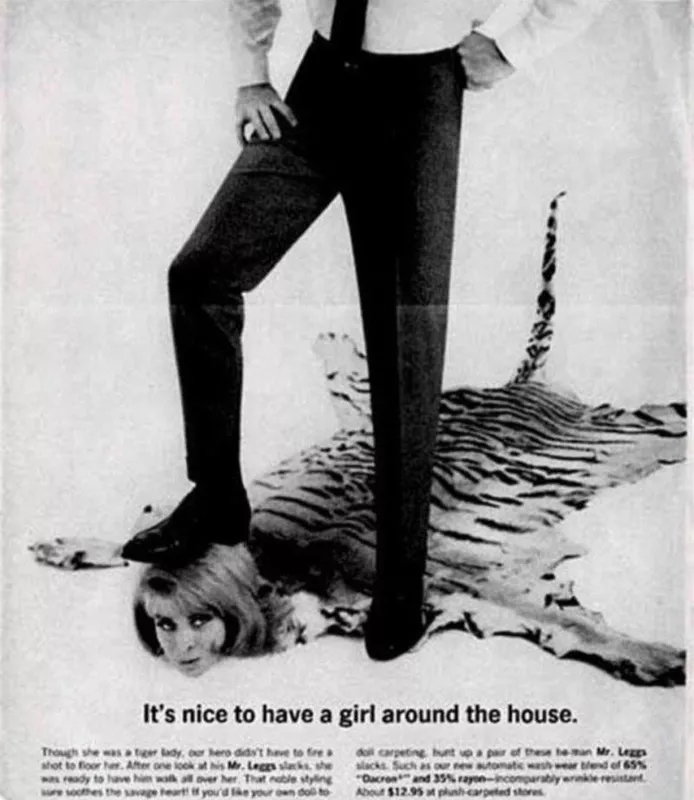
Mr. Leggs
The competition is fierce, but if you’re looking for an ad to really make your skin crawl, this 1950s offering from Mr. Leggs is a frontrunner. There’s no doubt who is in charge in this image — the man literally has his foot on top of the woman’s head, striking some kind of victory pose, as if he’s a hunter showing off his prized kill.
The underlying message, enforced by her apathetic expression, is that women are something to keep under your shoe. To give it the benefit of the doubt, it’s trying to be funny. It fails miserably.
‘Sooner or later your wife will drive home’
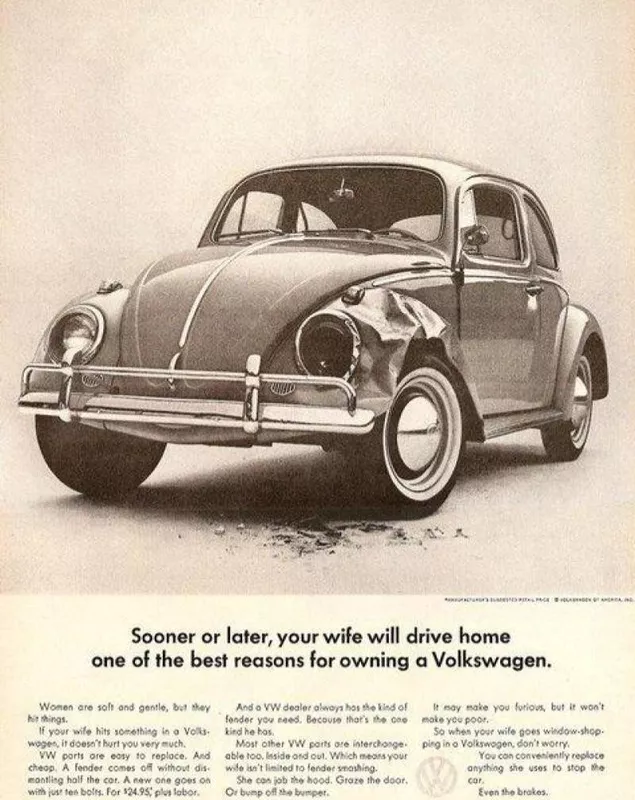
Volkswagon
A man who lets his wife get behind the wheel of his car is a very brave man indeed, if this vintage ad is to be believed. According to Volkswagen, wives have a habit of fender-smashing, hood-jabbing, door-grazing and even ripping off entire bumpers. Oh, and they don’t know how to use the brakes. It’s all enough to make a man “furious,” apparently. Well, wouldn’t you be?
‘The More You Play the Harder It Gets’
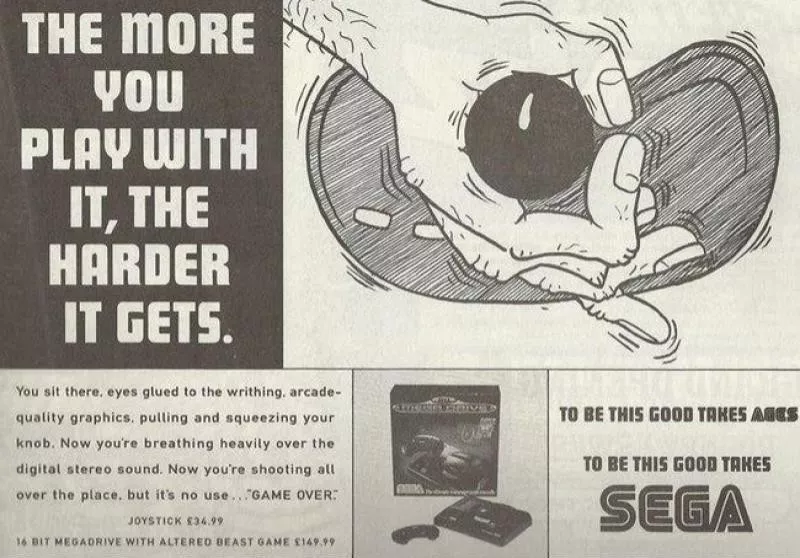
Sega
It’s pretty unbelievable that Sega got away with this 1990s ad for the Mega Drive. As if the tagline isn’t brazen enough, the small print includes such delights as “squeezing knob” and “shooting all over the place.”
The entire campaign was sexist (“female players may find difficulties with higher skill levels”) and distasteful (one shows a man urinating the Sega logo in the snow). A similar campaign for the Sega Game Gear jumped on the bandwagon with yet another masturbatory reference (“Something to do with your hands that won’t make you go blind”). They were trying to shock, but came off looking a bit desperate.
‘Don’t worry darling, you didn’t burn the beer!’
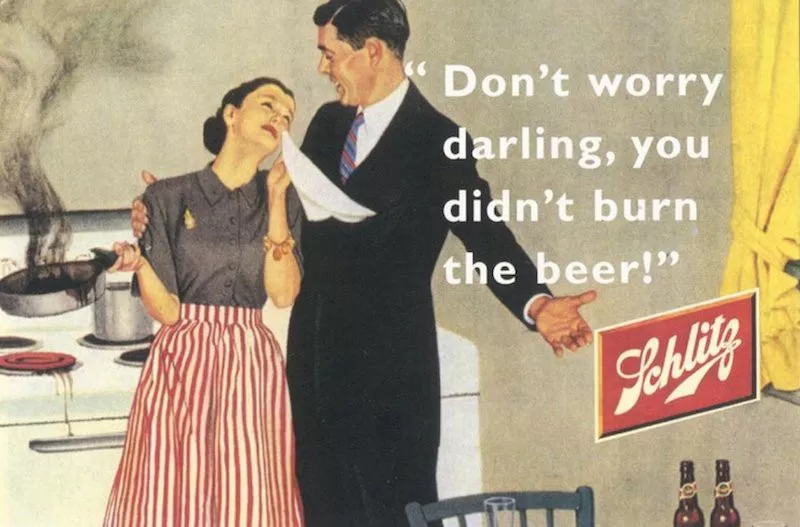
Schlitz
Pity the poor 1940s woman who can’t even manage to do the one thing she’s designed for: putting a tasty meal on the table for her hardworking husband. At least the husband in this ad can see the funny side of his wife’s inadequacies. She may have burned his dinner, but his Schlitz beer is something she can’t ruin.
‘Another Love-match Shipwrecked…’
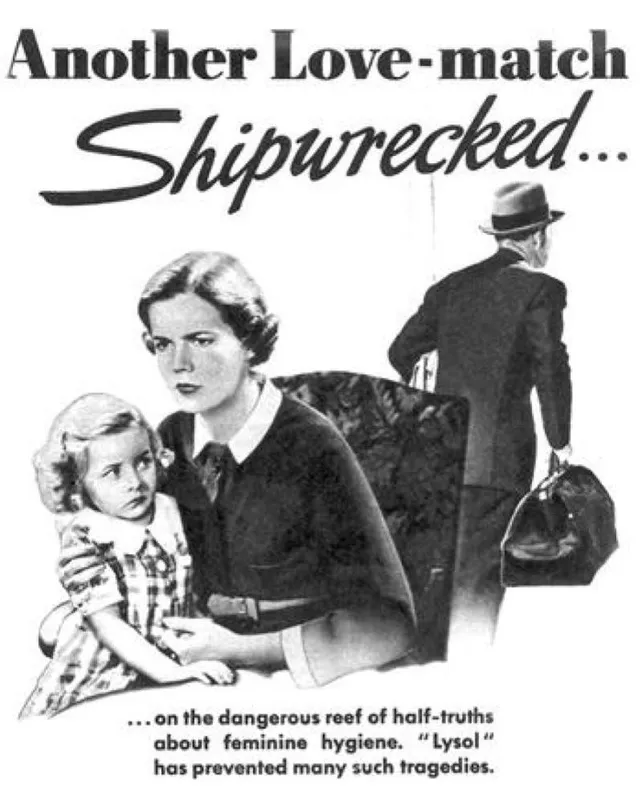
Lysol
Lysol disinfectant was sold as a douche in the 1930s. As if that’s not bad enough, the company produced a series of ads showing a man leaving his wife over serious “feminine hygiene” issues. Thankfully, Lysol “has prevented many such tragedies.” Whoever came up with the line the “dangerous reef of half-truths about feminine hygiene” has a lot to answer for.
If Men ‘Hate the Sight of You’ Read This
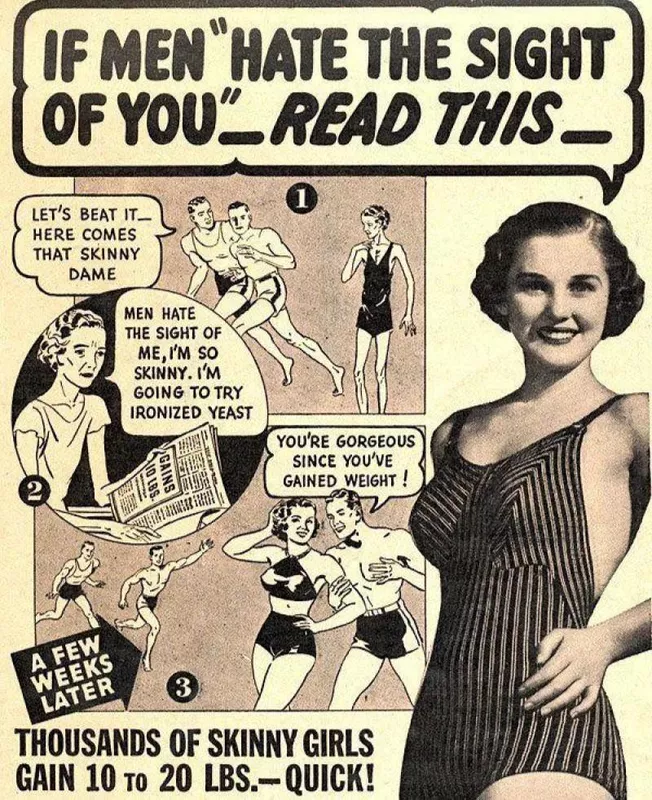
During the Depression, when people were thinner than usual due to lack of food, products that helped them gain weight were popular. Presumably men had shed the pounds too, but as this was the 1930s, it seems only women were expected to change their body size. To stop all the hate, of course. If the ads were to be believed, those ironized yeast products were nothing short of miracle workers. The “weight” they gave women went on their hips and breasts and nowhere else — guaranteed to give all the men heart eyes again.
‘Romance dies at the touch of DISHPAN HANDS’
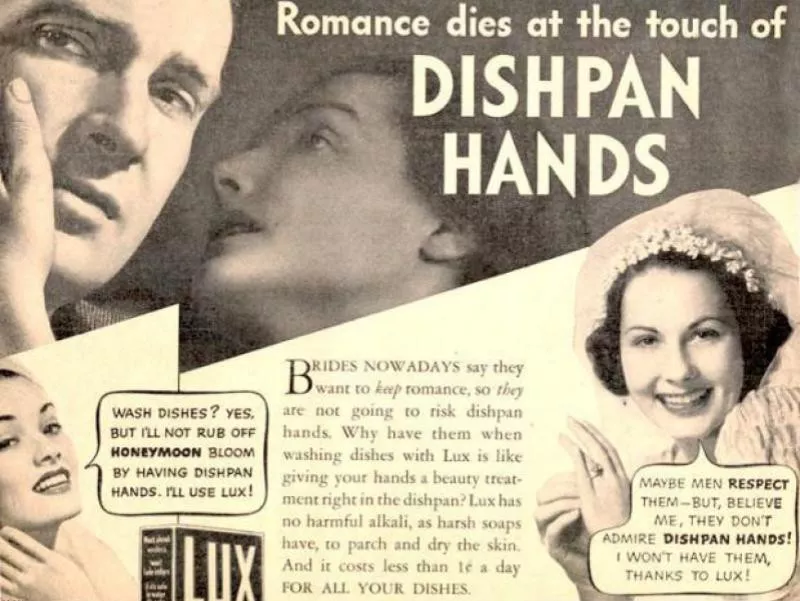
Lux
If there was a greater threat to 1930s Man’s libido than feminine hygiene issues, it was “dishpan hands.” In this case, it was Lux that saved marriages. The average woman had no choice but to spend large chunks of the day elbow-deep in hot water, so the only solution was to sell her a soap that would keep her hardworking hands beautiful and maintain that “honeymoon bloom.” Although the chap in the ad doesn’t look entirely convinced.
‘Presenting The Losers’
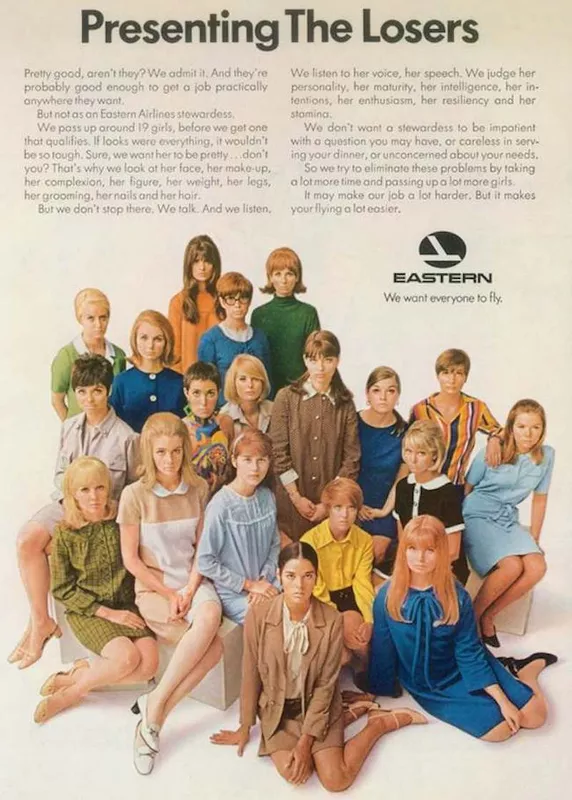
Eastern Airlines
By the time the 1970s rolled around, the pressure on women to be physically perfect was intense. For Eastern Airlines cabin crew, they also had to be patient, attentive, mature, well-spoken, enthusiastic and resilient. In other words, yet another reminder that they’re not good enough.
‘Married? No reason to neglect S.A.’ (Stocking Appeal)
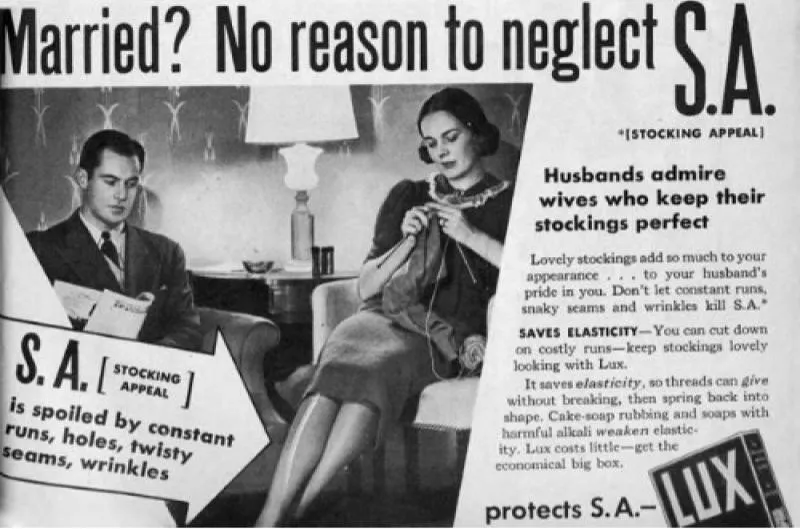
Lux
Getting married is no reason to let yourself go, and of utmost priority for any wife worth her salt is S.A., otherwise known as “stocking appeal.” The sight of a run in the stocking is enough to cause a man extreme distress, you see, and it might even be a fast track to divorce. (Let’s not even mention twisty seams and wrinkles.)
‘The best things in life come in Cellophane’
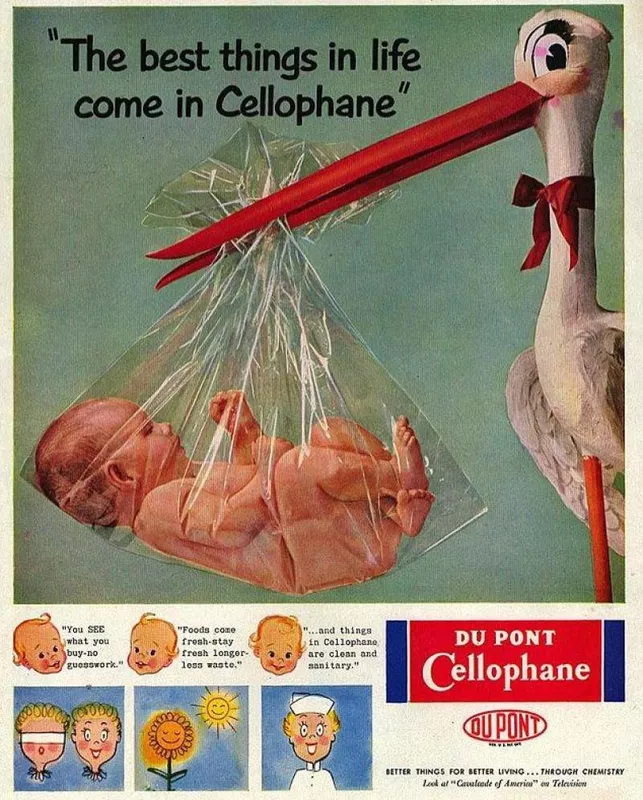
DuPont
DuPont went to great lengths to convince women to buy their cellophane in the 1950s, using all types of ads to get their point across. One of the most bizarre featured a naked baby inside the plastic wrap — because housewives go ga-ga over babies, in any shape or form? Surely a slab of meat or a block of cheese would get the point across without ringing child safety alarm bells.
‘Because innocence is sexier than you think’
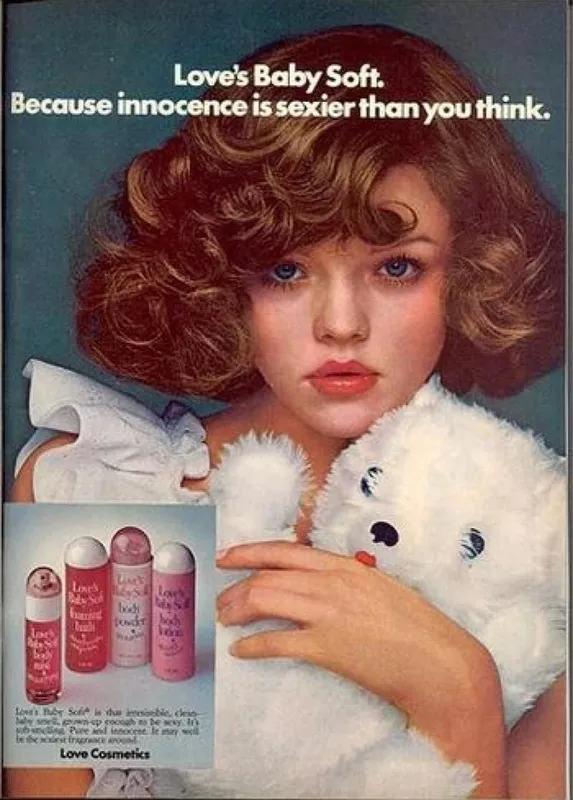
Love’s Baby Soft
One of the creepiest vintage ads of all time is for Love’s Baby Soft fragrance in the mid-1970s. It features a pre-teen girl in a sexualized pose, holding a teddy bear, and insists that the product’s “clean baby smell” may well be the “sexiest fragrance around.” It was common for adult women to be infantilized in ads, but this role reversal is even more disturbing.
‘Men are better than women!’
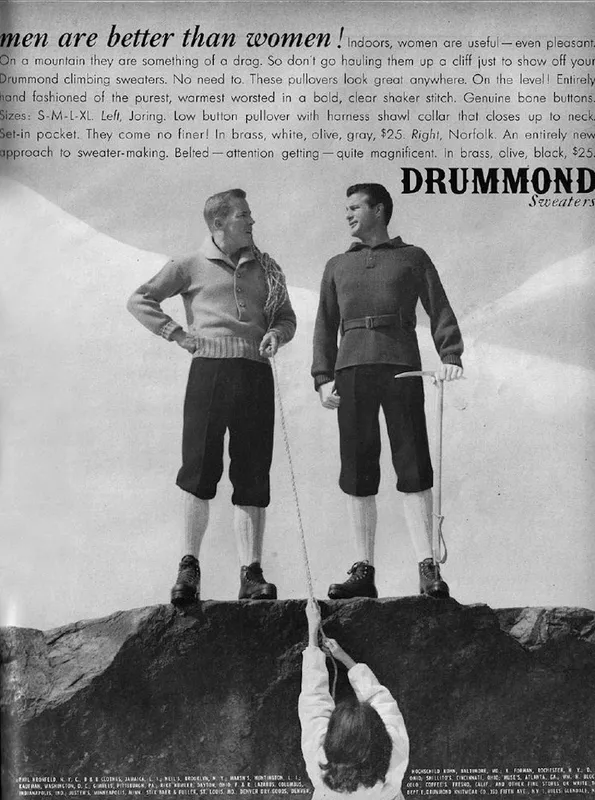
Drummond Sweaters
For the avoidance of doubt, this Drummond sweaters ad from the late 1950s hammers home the point advertisers spent decades making: men are better than women. With an exclamation mark, because it really is that important. Oh, and “women are a drag.” It’s not at all clear what this has to do with sweaters, but that’s a minor point.
‘Husband Pleasing Coffee’
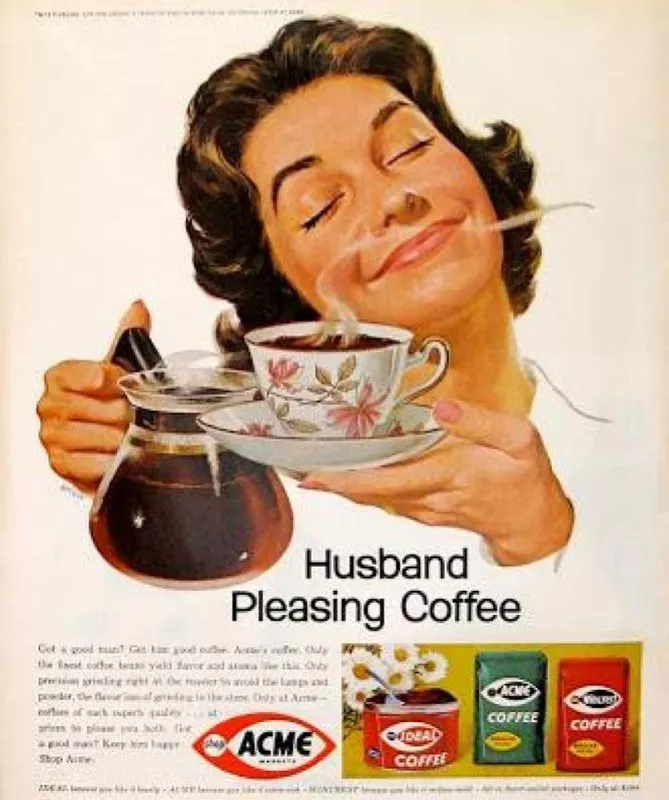
Acme Coffee
In the 1960s, the most important quality in coffee wasn’t how it tasted. It was how much it pleased your man. And if his cup of joe didn’t hit the spot, whose fault would that be? You can bet it wouldn’t be due to any error on Acme Coffee’s part, but some colossal failure carried out by an incompetent wife.
It’ll Blow Your Mind Away
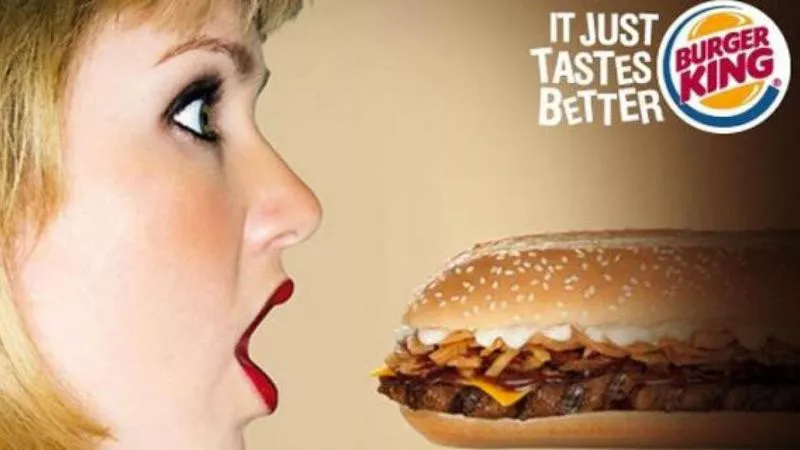
Burger King
All the proof you need that not everyone has moved on from the sexist, discriminatory rhetoric of earlier decades is the ad to promote Burger King’s “BK Super Seven Incher” burger. You’d be forgiven for thinking this was made in the 1950s, but it actually came out in 2009 thanks to an agency in Singapore that thought innuendo was the best way to boost burger sales. By combining desire, women and food, it has all the elements traditionally used to sell anything to men, and it’s all the more disgusting because it was only made 10 years ago.